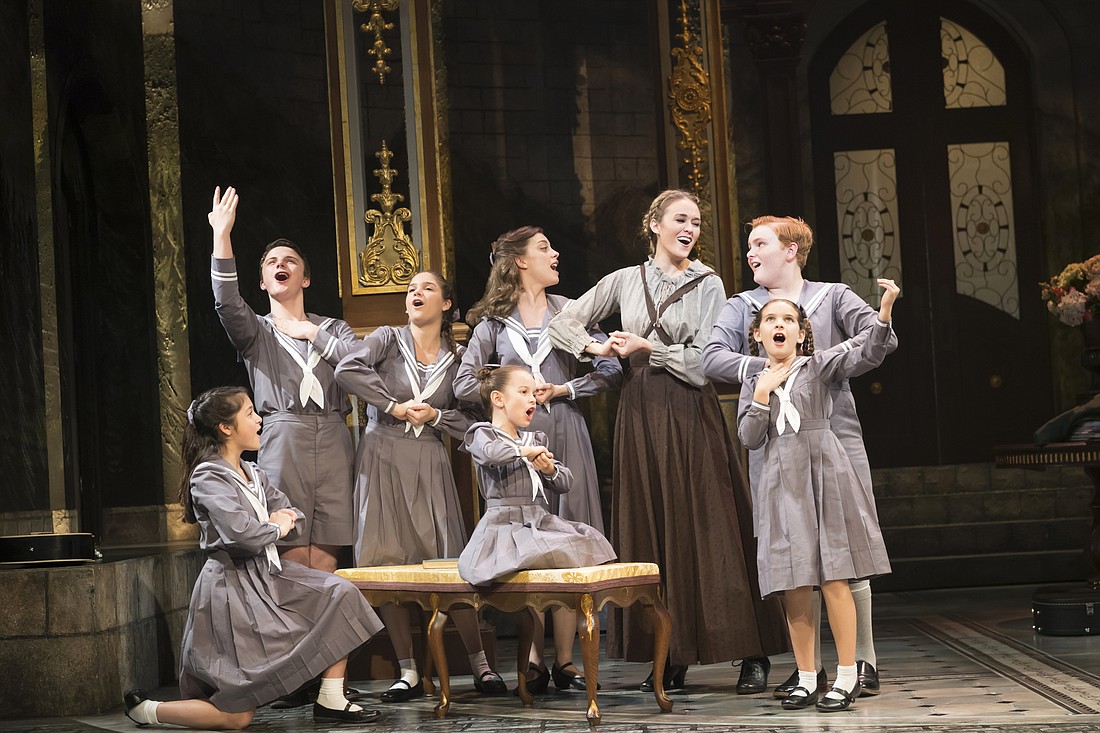- May 3, 2025
-
-
Loading

Loading

“The Sound of Music” is in the air in the Asolo Rep’s latest production. The musical comes fully loaded with compositions by Richard Rodgers, lyrics by Oscar Hammerstein II, and a book by Howard Lindsay and Russel Crouse. All that, and high-expectations. It defies them, but it doesn’t disappoint.
In case you’ve spent your life in a nunnery, here’s the plot:
The story (loosely based on the real-life Trapp Family Singers) begins in Salzburg, Austria, in 1938. Nonnberg Abbey has a problematic postulant named Maria (Maddie Shea Baldwin). Our pretty nun-in-training is a free spirit (with a song in her heart) who can’t adjust to the abbey’s strict discipline. Plan B? The Mother Abbess (Liz McCartney) sends her to work as a governess for the von Trapp family. Captain von Trapp (Tally Sessions) is the patriarch—a retired naval officer who runs his household like a battleship. He issues commands with a shrill bosun’s whistle. His seven children obey, get in line and don’t play or sing. But Maria changes the Captain’s lack of tune. She uses the power of music to unlock the hearts of the kids and the Captain, too. After a couple of snags, Maria and the Captain get hitched. After a few rehearsals, the von Trapps become a crowd-pleasing, singing family. But through all this sunny happiness, the Nazi threat keep growing like a black cloud. Despite his control-freak tendencies, the captain is an Austrian patriot who despises the Nazis. Too bad. After absorbing Austria, they want to absorb the Captain, too. The bad-news telegram arrives right after their honeymoon. Hitler wants to put the Captain in charge of a shiny, new Nazi battleship. Immediately. But the von Trapp Family Singers pull a fast one after one last song contest. They skip out in the standing ovation and head for the hills to Switzerland, singing all the way, of course.
This lighthearted story has a surprising dark side. The saccharine movie version airbrushed the evil. Josh Rhodes, the director and choreographer, draws it out with gutsy, inventive, original choices. He delivers a deeper sense of the Nazi threat and what’s at stake for the beloved characters. That’s as clear as night and day in one scene: the von Trapp family’s final concert. Swastikas suddenly unfold. Well-armed storm troopers take position at exits and opera boxes. It’s just a hint of the ugly reality, but it’s bone-chilling enough.
The cast has no weak links. Baldwin’s Maria is adorable without being a Julie Andrews imitation. She doesn’t even sing like Andrews. You get more of a sense of Maria’s girlish side. Like a butterfly in a cocoon, her character’s still in the process of becoming. She’s not an icon yet. Sessions’ patriarch isn’t the typical, two-dimensional martinet. His story and character get all due respect. The Captain either surrenders to the Nazis or surrenders his ancestral title, villa, lands and his fortune. Doing the right thing demands great sacrifice. Sessions' character doesn’t think twice.
Liz McCartney’s sympathetic Abbess is in Maria’s corner — and hits operatic heights in “Climb Every Mountain.” Darren Mathias’ Max is a charmingly roguish impresario and fixer. He’s a happy-go-lucky survivor, unencumbered by principles. He’ll get along with anybody, Nazis included. (If the Martians ever invaded, Max would probably bring them a fruit basket.) Kate Loprest paints another apt portrait of moral flexibility as Baroness Schraeder, the Captain’s brief fiancée. Kudos to all seven child actors. Sophie Lee Morris is especially lovable as Liesl, the eldest. As her boyfriend, Rolf, Cole Doman goes from lovable to creepy. He’s a typical teen whose mind is slowly poisoned by Nazi lies. Ann Morrison is quietly comical as Frau Schmidt, the von Trapps' taciturn, long-suffering housekeeper.
There are no big dance numbers. But Rhodes’ choreography and Sinai Tabak’s arrangements make the most of intimate numbers like “The Lonely Goatherd” and “So Long, Farewell.”
Costume designer Loren Shaw nicely captures the period. She gets a big laugh in the scene when Maria dresses the kids in play clothes she sewed from discarded curtains (I kept thinking of Carol Burnett’s “Gone With the Wind” sketch). Cory Pattak’s lighting and projections and Josh Milligan’s sound design subtly change the mood. Set designer Paul Tate dePoo III actually thinks inside the box. Instead of evoking the great outdoors, his set feels intentionally claustrophobic. No bright painting or projection of the Alps. Just a curved wall, adorned with a crumbling mural of the Alps. (According to the director, this design choice evokes many characters’ denial of the coming storm.)
Don’t let this talk of darkness create the wrong impression. Nazis or not, it’s a feel-good show. The songs pluck your heartstrings shamelessly — including a few the movie left out. It’s great material. Music director Jordan Cunningham and arranger Tabak do a great job with it.
Expect a mix of uplifting anthems and tearjerkers. Bring a handkerchief — and don’t forget your suspension of disbelief. I’ll stick with one example.
The von Trapp kids grew up in a music-free household. Maria pops in, strums the guitar, and teaches them “Do-Re-Mi.” After a 10-minute rehearsal, she turns them into human carillons doing complicated harmonies. Those von Trapp kids sure learn fast, huh?
It obviously took the real kids a little more time. To be fair, real life doesn’t fit a neat Aristotelian plot arc. To keep the musical moving, the story had to be simplified. I get it.
Fictionalized or not, this musical’s story tells an uncompromising truth. Like the old song says, “Which Side Are You On?” That song’s not in the show. But the choice is there in every scene.